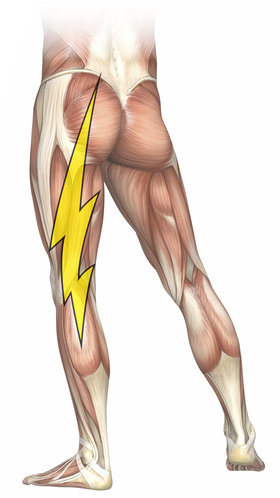“SCIATICA” WHAT IS IT? AND HOW TO TAME IT?

“Sciatica” is the symptoms that described the pain that starting from the lower back and radiates down to the leg, usually one side, below the knee. This pain sometimes described as jolting, electric shock-like and worsening with coughing, sneezing, or sometimes straining yourself while having a bowel movement as these activities increasing the pressure in your disc causing the “herniated” disc or the “herniation” part pushing more onto the spinal nerve.
The most common cause of sciatica is the herniated disc. Discs are tire-like structures that sit between the bones of the spine. If the outer rim of the disc tears, usually due to routine pressure on the lower back, the jelly-like inner material can come out and pinch or inflame the nearby nerve. Sciatica is most common in people 30 to 50.
Sciatic nerve is the major nerve that forms from several spinal nerves. Once it forms the sciatic nerve in the pelvis, it then travels down to your thigh and legs; therefore it could potentially get pressed or pushed along their pathway. The cause of “Sciatica” could be from outside the spine as mentioned. Sometimes, the muscle in the buttock called “piriformis” can pressed the sciatic nerve at the pelvis. This called piriformis syndrome.
The symptoms are likely from inflammation and mechanical pressure on the nerve. The diagnosis is by doing a focused history and physical examination. MRI can help confirm the diagnosis but not the first line of diagnosis. The symptoms usually resolve within 3-4 weeks. Supervised exercise and physical therapy may benefit some groups of patients. Anti-inflammatory medication either in the form of pills or injection can reduce the inflammation.
Some patients who do not have relief in 6 weeks of non-srugical treatments likely need surgery. The modern day technique can be done through a small incision utilizing minimally invasive technique which several benefits. One of the benefits is to minimize the collateral damage to the normal surrounding tissue; thus quicker recovery.
Please contact us to find out the best treatment for herniated disc and more importantly if you are a candidate for Microspine endoscopic discectomy if you need surgery.



